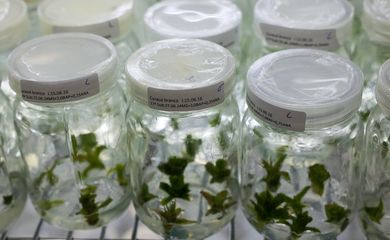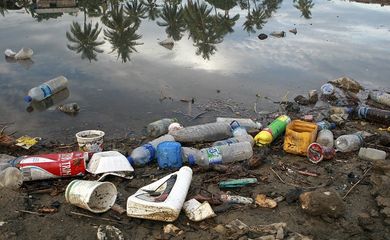Brazilian scientists develop rapidly degradable bioplastic

Brazilian researchers have developed a type of bioplastic that degrade quickly when composted or when discarded in the environment. The material is innovative as it uses small bioactive encapsulated particles from functional foods like carrots and chia. Unlike synthetic plastic, it does not leave residues that pollute the environment, harming life in the oceans and even human health.

The research is coordinated by Maria Inês Bruno Tavares, a professor at the Institute of Macromolecules at the Federal University of Rio de Janeiro (UFRJ), and has had two recent articles published in the international scientific journal Journal of Applied Polymer Science, including a feature on the May cover.
Plastic pollution is one of the greatest challenges of our time, according to the United Nations (UN). Around the world, one million plastic bottles are bought every minute and some five trillion plastic bags are used every year. Half of all plastic produced is designed for single-use purposes, used only once and then discarded.
Plastic is made up of polymers, which are large molecules. In order to be broken down in the environment, Professor Tavares noted, these molecules are fragmented into smaller particles, until they reach what is known as microplastic. Microplastics are in the air, in the water, end up being absorbed by plants, ingested by both animals and humans, and can cause allergies and damage health.
“All polymeric material—whether biodegradable or synthetic—generates microplastic in order to degrade. The difference between the packaging we are making and traditional packaging is that ours will generate some microplastic, and it will all be consumed by microorganisms. Synthetic packaging won’t. It will generate microplastic and the microplastic will stay,” she noted.
Under ideal composting conditions, the researcher added, the bioplastic material developed loses 90 percent of its mass in 180 days and, even if discarded in the environment, it degrades quickly. Since it uses functional foods in its composition, the material degrades in the environment even faster than current compostable plastics.
The fate of plastics
This bioplastic material, Professor Tavares said, is intended to minimize the use of synthetic polymers. Unlike synthetic polymers, bioplastic cannot be recycled. However, it meets the demand for a large part of the use of plastic, which ends up being used only once.
“Synthetic polymers are not going to run out,” says the professor. Some materials cannot be replaced, such as airplane or car parts or even safety equipment, like helmets. They will continue to be made of synthetic polymers, but we can change much of what we consume on a daily basis. Most packaging can be made from biodegradable polymers,” she argued.
In order for humanity to cope better with the amount of waste produced, and reduce microplastics in the environment, “everything that can be biodegradable must be biodegradable,” she added, and synthetics must then be disposed of correctly, reused, recycled, or incinerated, as in the case of drugs and those used in hospitals.
The research is funded by the Rio de Janeiro State Research Foundation and is currently being patented. The team is also looking for companies interested in producing bioplastics.



